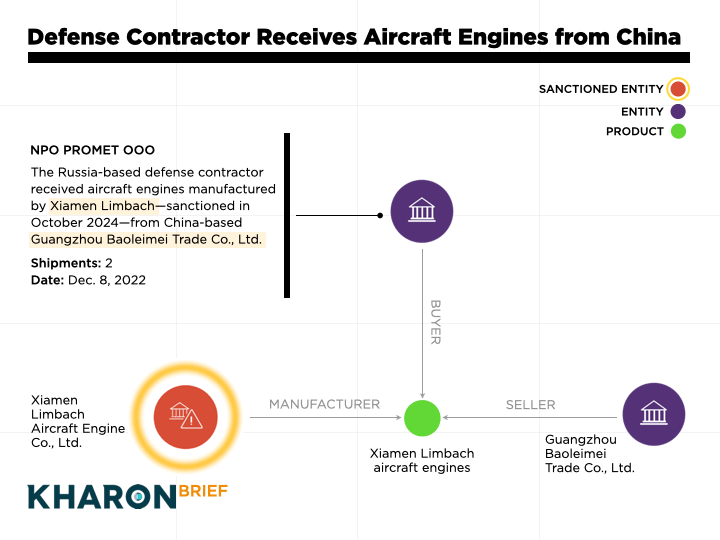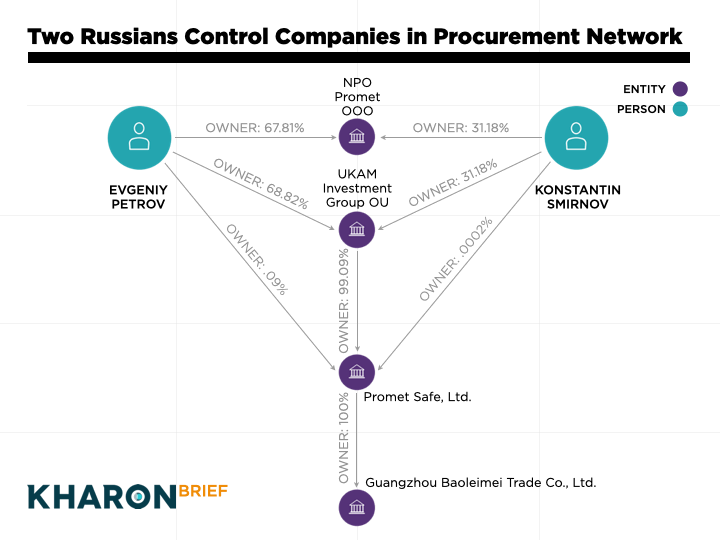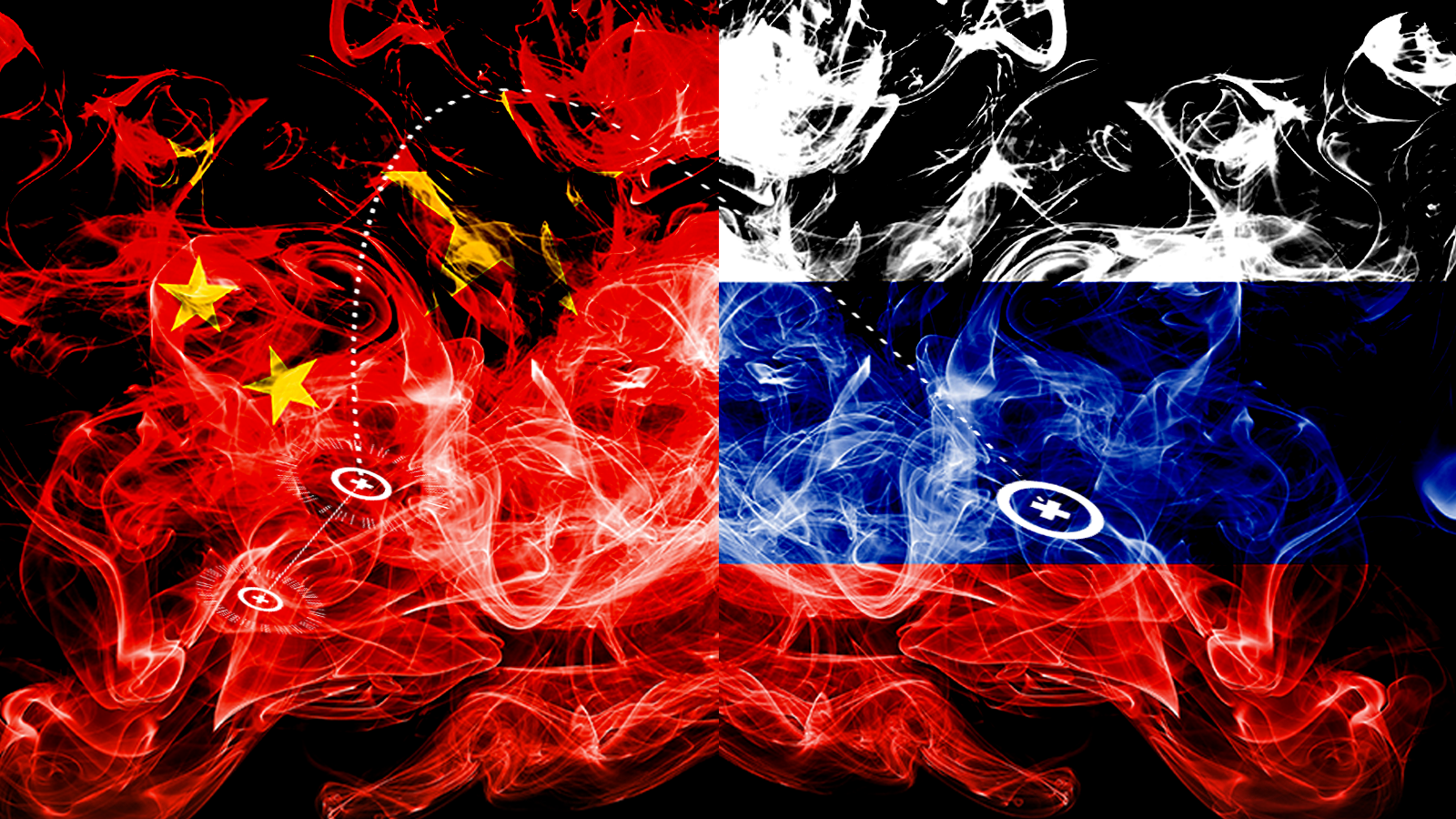A Kharon investigation has revealed that an international network of companies, effectively owned by two Russian nationals with ties to China and the Russian military, facilitated the sale and transfer of aircraft engines produced by a Chinese manufacturer sanctioned in October 2024. This discovery comes amid recent U.S. sanctions aimed at blocking such transactions between China and Russia.
Guangzhou Baoleimei Trade Co., Ltd., a Chinese company, supplied aircraft engines to Russian defense contractor NPO Promet. Both companies are ultimately controlled by two Russian businessmen, Evgeniy Petrov and Konstantin Smirnov.
Trade data shows that in December 2022—months after Russia’s invasion of Ukraine—Guangzhou Baoleimei shipped aircraft engines directly to NPO Promet. It is unclear whether the engines were intended for manned or unmanned aircraft.
The engines were manufactured by Xiamen Limbach Aircraft Engine Co., Ltd., a Chinese company sanctioned by the U.S. Department of the Treasury in October for its “involvement in the development and production of Russia’s Garpiya series long-range attack unmanned aerial vehicle (UAV).”
Guangzhou Baoleimei Trade Co., Ltd., a Chinese company, supplied aircraft engines to Russian defense contractor NPO Promet. Both companies are ultimately controlled by two Russian businessmen, Evgeniy Petrov and Konstantin Smirnov.
Trade data shows that in December 2022—months after Russia’s invasion of Ukraine—Guangzhou Baoleimei shipped aircraft engines directly to NPO Promet. It is unclear whether the engines were intended for manned or unmanned aircraft.
The engines were manufactured by Xiamen Limbach Aircraft Engine Co., Ltd., a Chinese company sanctioned by the U.S. Department of the Treasury in October for its “involvement in the development and production of Russia’s Garpiya series long-range attack unmanned aerial vehicle (UAV).”

Kharon users can explore this Insight directly in the ClearView portal.
According to the Treasury, the Garpiya drone has been used by Russia in Ukraine, “destroying critical infrastructure and causing mass casualties.” These drones are designed and developed by Chinese experts who collaborate with Russian defense firms before shipping them to Russia.
“Russia increasingly relies on the expertise of foreign professionals and the import of sophisticated technologies to sustain its weapons program and advance its military campaign against Ukraine,” said Acting Under Secretary of the Treasury for Terrorism and Financial Intelligence Bradley Smith.
Since the start of the war in Ukraine, the U.S. government has accused China of supplying weapons to Russia, a claim Beijing has repeatedly denied.
The Oct. 17 designation of Xiamen Limbach Aircraft Engine and other Chinese entities aimed to target the “direct activity” between China and Russia, according to senior Biden administration officials who spoke to the Associated Press before the sanctions were announced.
An Interconnected Network
Evgeniy Petrov and Konstantin Smirnov are at the center of a network of companies that spans multiple countries and industries.
The two businessmen are co-owners of NPO Promet, a Russian defense contractor with ties to the Ministry of Defense, according to The Insider.
“The company [NPO Promet] is a regular participant in the [Russian] Ministry of Defense's ‘Army’ forum, showcasing products such as fire-resistant ammunition boxes and casings for ‘Grad’ rocket launcher projectiles,” the news outlet reported.
In addition to their holdings in defense and manufacturing, Petrov and Smirnov are the owners of UKAM Investment Group OU, an Estonian firm that owns the majority of a Bulgarian company called Promet Safe. The Bulgarian firm advertises itself as “the biggest safe and steel furniture manufacturer in Europe.” Promet Safe is also the parent company of Guangzhou Baoleimei.
“Russia increasingly relies on the expertise of foreign professionals and the import of sophisticated technologies to sustain its weapons program and advance its military campaign against Ukraine,” said Acting Under Secretary of the Treasury for Terrorism and Financial Intelligence Bradley Smith.
Since the start of the war in Ukraine, the U.S. government has accused China of supplying weapons to Russia, a claim Beijing has repeatedly denied.
The Oct. 17 designation of Xiamen Limbach Aircraft Engine and other Chinese entities aimed to target the “direct activity” between China and Russia, according to senior Biden administration officials who spoke to the Associated Press before the sanctions were announced.
An Interconnected Network
Evgeniy Petrov and Konstantin Smirnov are at the center of a network of companies that spans multiple countries and industries.
The two businessmen are co-owners of NPO Promet, a Russian defense contractor with ties to the Ministry of Defense, according to The Insider.
“The company [NPO Promet] is a regular participant in the [Russian] Ministry of Defense's ‘Army’ forum, showcasing products such as fire-resistant ammunition boxes and casings for ‘Grad’ rocket launcher projectiles,” the news outlet reported.
In addition to their holdings in defense and manufacturing, Petrov and Smirnov are the owners of UKAM Investment Group OU, an Estonian firm that owns the majority of a Bulgarian company called Promet Safe. The Bulgarian firm advertises itself as “the biggest safe and steel furniture manufacturer in Europe.” Promet Safe is also the parent company of Guangzhou Baoleimei.

Kharon users can explore this Insight directly in the ClearView portal.
The two men hold dual citizenship: Petrov is also a Polish national, while Smirnov holds a Romanian passport.
This network, which spans Russia, China, Bulgaria, Estonia, and Lithuania, highlights the global reach of the duo's business operations and their involvement in the defense and manufacturing sectors.
-—-—-
More on Military End Use
This network, which spans Russia, China, Bulgaria, Estonia, and Lithuania, highlights the global reach of the duo's business operations and their involvement in the defense and manufacturing sectors.
-—-—-
More on Military End Use







